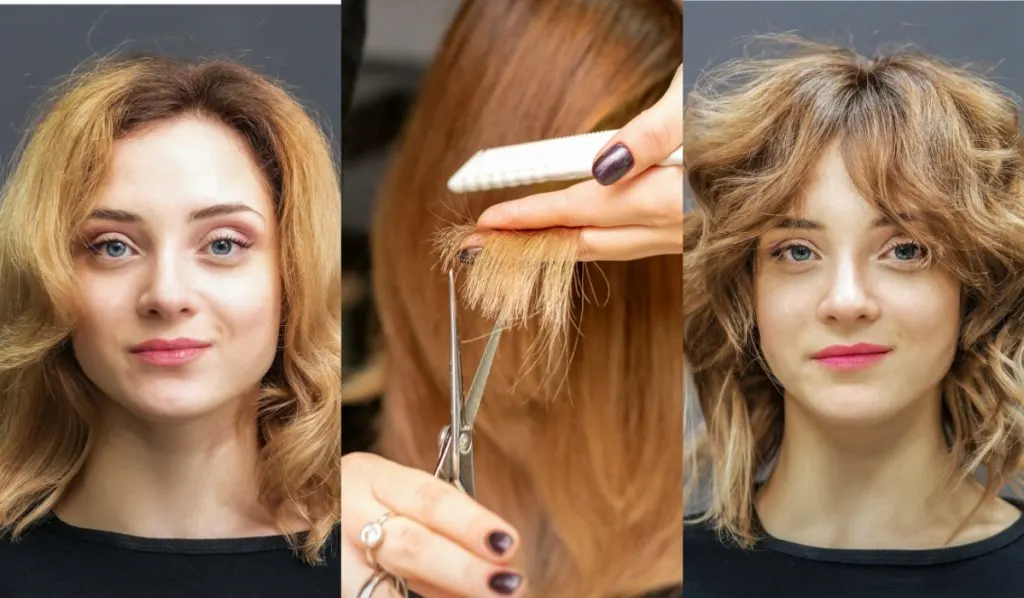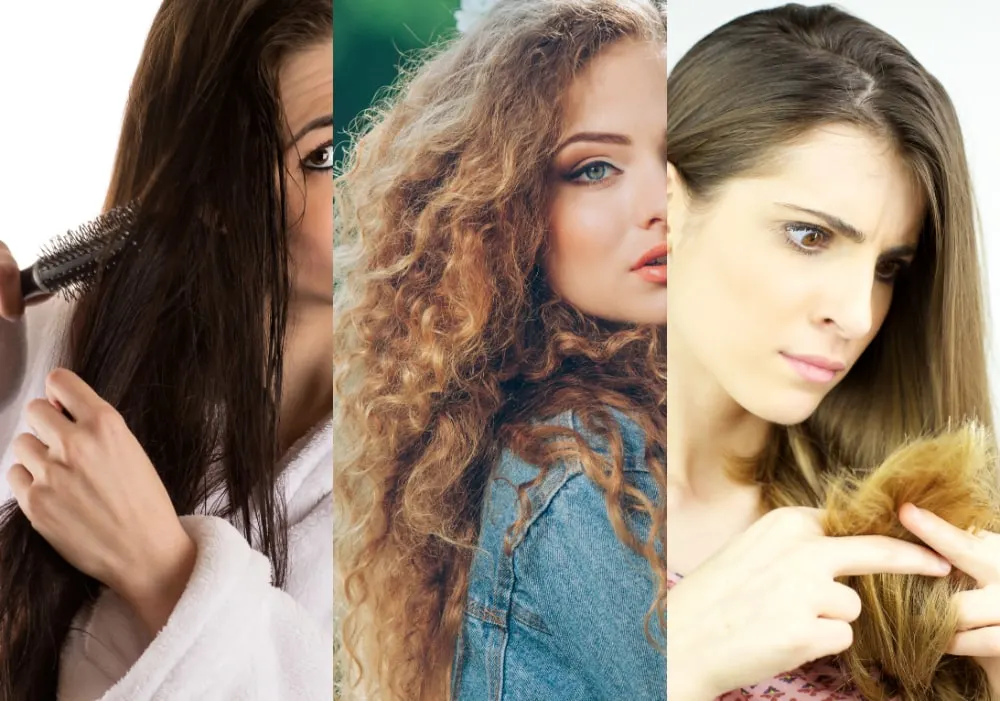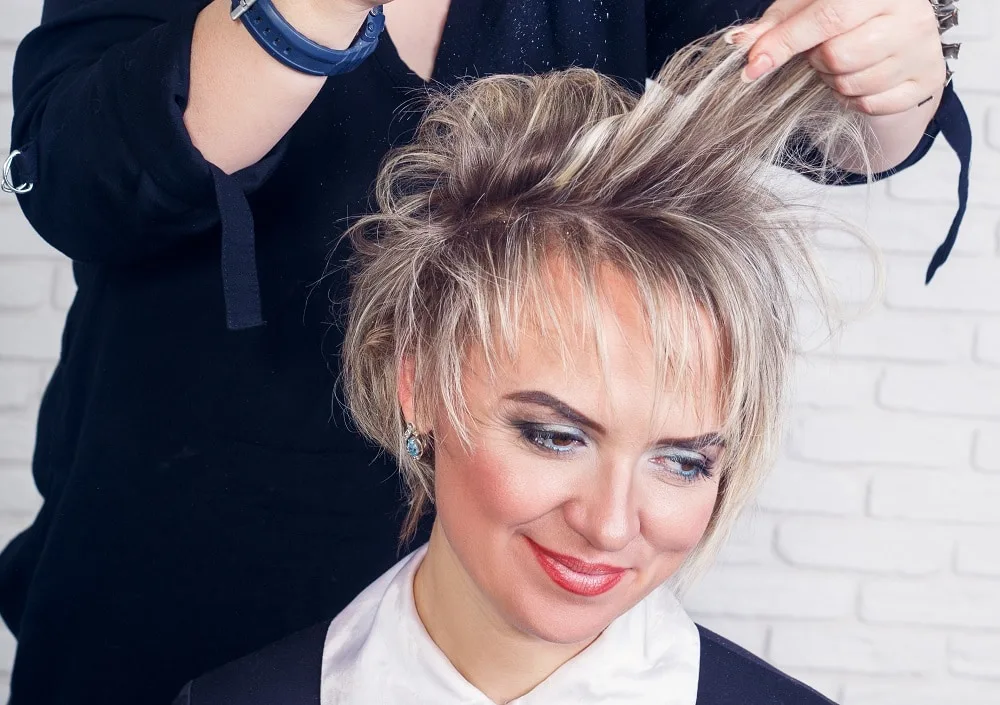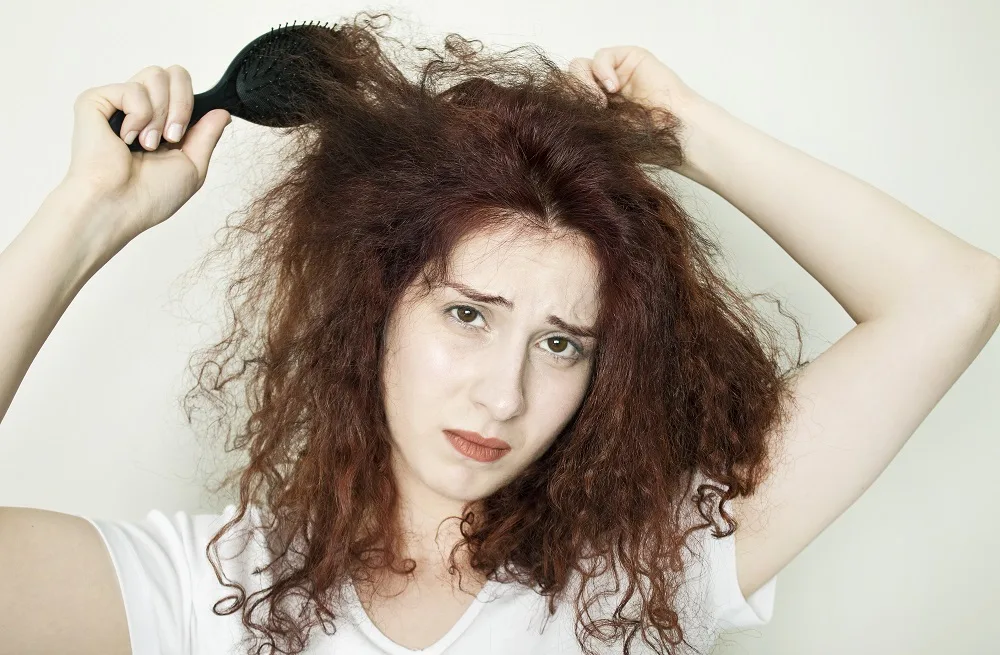Does your fine hair grow thick, flat, and unmanageable? If so, you might wonder, “Should I get my hair thinned?” While thick, lustrous hair looks healthy and desirable, it may be prone to tangles and frizz. A suitable care routine for your hair type can help restore its fineness, health, and luster.
This article looks into when to thin out your hair, the pros and cons of thinning your hair, and more.
Summary
- Thinning out hair makes it lighter, finer and adds volume.
- Hair thinning is often beneficial for those with excessively thick, heavy, and flat hair.
- Factors such as genetics, hormones, and age influence hair thickness.
- Thinning shears are often used to thin hair, cutting about 15% without affecting overall length.
- Signs you should get hair get thinned: frequent brushing, long drying times, low scalp visibility, fast usage of hair care products, frizz in high humidity, and thick hair strands.
- How often to get your hair thinned depends on hair growth rate and length.
- Benefits of hair thinning include easier hair management, using fewer hair care products, lighter feeling on the head, cooler feel in hot weather, and ease in recreating styles at home.
- Thinning can be damaging to curly hair and can lead to frizz, especially when done by an inexperienced stylist.
- If thinning goes wrong, it can take a long time for hair to regain thickness.
- Thinning out hair should typically be done every 3-4 months.
- Thinning out hair can potentially cause damage, resulting in frizz, split ends, and breakage.
What Does It Mean To Thin Out Your Hair?

Thinning out your hair means making it lighter and finer while creating volume. If your hair is thick but well-managed, it’s less likely to be a cause for worry. However, if your hair becomes excessively thick, heavy, and flat, you’ll probably want to visit your hairstylist for thinning.
Some people grow extremely thick hair because they have wider follicles, resulting in thicker hair strands. Genetics also influences how thick your hair grows, which explains why people of East Asian descent grow thicker hair strands.
Other factors to consider regarding hair thickness include hormones and age. Getting your hair thinned doesn’t usually affect its overall length. So if you prefer to keep your long hair, your hairstylist should recommend the best way to thin it.
Your stylist can use thinning shears to cut around 15% of your hair. The only time thinning can affect your hair length is when your hairstylist recommends a haircut.
Adopting a suitable DIY hair care routine is the best way to prevent your hair from becoming thicker and heavier.
When Should I Get My Hair Thinned?

You should get your hair thinned if it becomes thick, volumized, and challenging to manage. Talk to your hairstylist about how often you should thin your hair. Your hair growth rate and length determine how soon you need to get your hair thinned.
While thinning your hair out seems like the best way to care for your fine hair, it might sometimes cause frustration. It’s therefore advisable to find a hairstylist with several years of experience.
An experienced stylist should know how deep to go with the thinning shears to prevent your hair from getting thick soon.
If thinning was done just an inch from your hair tips, you’re more likely to go back for thinning in about two months. If your stylist went deeper to remove the thick part of your hair strands, it might take you a few months before it becomes thick.
Typically, hair grows about 1/2” (half an inch) per month. That means you may not notice signs of your hair growing thicker and denser one month after thinning.
If you’ve neglected your hair for a long, it might grow flat due to the extra weight from heavy strands, dirt, or hair care products. Getting your flat and thick hair thinned helps to lift it while making your hair strands lighter.
But how can you tell if your hair is exceptionally thick and requires thinning? Here are several signs to look out for.
- You have to brush your hair more often.
- After you’ve washed your hair, it takes centuries to dry.
- You don’t have much visible scalp.
- You run out of hair care products such as shampoo and conditioner fast.
- Your hair freezes in winter if you fail to dry it properly.
- Your hair becomes frizzy if the humidity level in the air is high.
- Your hair strand looks as wide as sewing thread.
- You have a ponytail whose circumference is more than three inches.
So, should I get my hair thinned? First, consider why your hair is growing too thick. If it’s out of neglect, you can build your hair care routine to reduce the bulk and restore your hair’s health.
Pros of Thinning Out Hair
Here are the reasons thinning out your hair can be a wise decision:
Hair Becomes Easy to Manage

Thick hair can be challenging to manage. You’ll have much to deal with if you want to keep thick hair in good condition before leaving the house.
For example, you must comb, brush, wash, and blow-dry it more often. Sometimes, you’ll be forced to do a ponytail to ensure your hair doesn’t look wild.
This kind of hair is not the best for individuals with busy schedules who don’t want to spend long hours fixing their hair. Thinning out your hair controls the volume of your hair, minimizing the time and effort spent when managing it.
Uses Less Hair Care Products
An excellent way to care for your natural hair is to apply the appropriate products depending on your hair type. If you have incredibly thick hair, you’ll need to use many hair care products such as moisturizers, shampoo, and conditioners.
You’ll also need to use them more often to keep your thick hair in a better condition.
Getting your hair thinned removes the excess hair strands that require more products. This leaves you with lighter and finer hair that needs fewer haircare products to stay in good shape.
Feels Lighter on the Head
Thick hair is dense and can feel heavy on the head. People with thick hair may only realize how heavy it is once they get it thinned out. Your hairstylist removes the thick and bulky hair in different areas, leaving you with lighter and finer hair.
Hair Feels Cooler During Hot Weather
Thick hair can retain heat in hot weather and make your head feel like a furnace. It retains more heat on your head and increases sweating.
You can get your hair thinned out to avoid such inconveniences, especially in the summer. Thinning out your hair removes the bulk, leaving it feeling lighter and cooler in the summer.
Easy To Recreate Styles at Home

Getting your hair thinned allows you to achieve a modern, youthful, or classic hairstyle. Your stylist can use thinning shears to shape and style your hair depending on the desired hairstyle.
And the good thing is that you only need to use your hair styling tools to recreate the style. You will take less time in the morning to recreate the style.
Cons of Thinning Out Hair
While thinning out your hair offers great ways to keep it in good shape, it might sometimes lead to disappointments.
Can Damage Curly Hair
Thinning out hair can be a blessing or a curse to curly-haired individuals. If you want to retain your curls in good condition after thinning them, work with an experienced stylist.
If your stylist is inexperienced, they might damage your curls. Look for a stylist with several years of experience handling curly hair with thinning shears.
Can Lead To Frizzy Hair

Should I get my hair thinned? You need to think twice if you have curly hair. Thinning shears are more likely to make your hair frizzy. This problem is more common with people whose hair is curly.
Besides getting frizzy, your hair will eventually develop split ends and start breaking. To prevent your hair from becoming frizzy, go to an experienced stylist to get your hair thinned.
Takes Longer To Grow Thick Hair Back
If thinning out has gone wrong and damaged your hair, you may wish your hair to back faster and restore its original look. Unfortunately, damaged hair can take months to become thick again.
So, When To Thin Out Your Hair?
To keep your hair in good condition, thin it out once it becomes extremely thick, volumized, flat, and difficult to manage. Your hair growth rate and length determine how soon you need to thin it.
If thinning was done just an inch from your hair tips, you’re more likely to go back for thinning in about two months. Work with an experienced stylist to determine how often you need to thin your hair.
FAQs
Here are some of the most common questions.
Before getting your hair thinned, below are several things you should consider:
● Your hair is likely to look different
● The method used might damage your hair
● It can take longer to grow thick hair back
● Your hair feels lighter and attains a new texture
● Styling it might become easier or harder
Layering and thinning are different. Layering means cutting hair at different places to make it appear shorter than others while thinning means reducing hair volume by cutting it using thinning shears.
Depending on your hair type, you should get your hair thinned out every 3-4 months.
You can thin out your curly hair but ensure to look for an experienced stylist. Thinning scissors can sometimes damage your curls and make them look frizzy.
Thinning out hair can sometimes damage it, especially when done by an inexperienced stylist. Your hair can become frizzy with split ends and result in breakage.
Trending Topic
